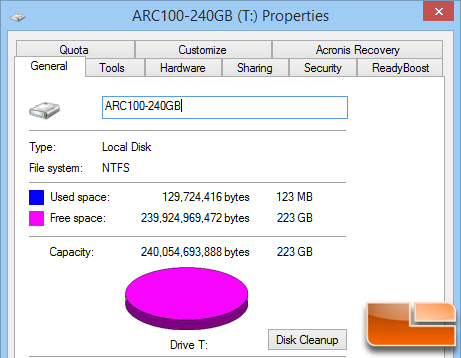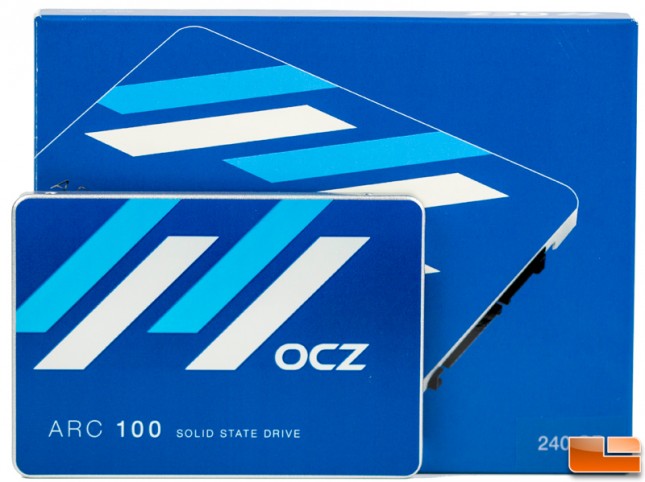OCZ ARC 100 240GB SSD Review
Final Thoughts & Conclusions
The OCZ ARC 100 240GB (1GB byte = 1,000,000,000 bytes) drive yields 223GiB (1Gib = 1,073,741,824 bytes) available to the user as reported by Windows. This is typical for a drive of this capacity after the spare area and Windows takes their share.
So now OCZ has several clear product tiers that fit each consumer market segment. In descending order of cost they have their Revo PCIe drives for workstations, their Vector drives for enthusiasts, the Vertex line for the mainstream consumers and now the ARC 100 for the entry-level, value oriented customers. With the pricing set at $74.99, $119.99 & $239.99 for the 120GB, 240GB and 480GB drives it should be very competitive in the budget drive space. The 240GB drive tested ends up being $0.54 per usable GB which is roughly the same as the Samsung 840 EVO 250GB and slightly over that of the Crucial MX100 256GB drive. These drives are probably the biggest competitors in this space. Comparing performance between them, the MX100 is faster in reads, especially in the IOPS arena but the ARC 100 has better write performance overall. The 840 EVO beats them both in most performance areas but not by a margin that would be discernible to the user. In our consistency testing, the ARC 100 performed much better than the MX100 and so should give a more even user experience, even after heavy usage. The MX100 and 840 EVO drives do come with cloning software and a 7mm to 9.5mm shim or 3.5″ adapter plate which is an extra value consideration as well if these items are of interest to you.
We tested out the power usage on the ARC 100 drive which OCZ claims draws an idle 0.6W and an active 3.45W. We tested both idle usage and then max usage by running our benchmark suite to find the peak reading. We found the idle usage to be 0.63W and active to max at 3.47W (0.5%). Bear in mind that this is the absolute peak and the average active power draw will be considerably less. This will mostly be a factor to take into consideration if you are intending to use this on a mobile platform as it has a bearing (albeit minor) on battery life. The Samsung drives are notoriously frugal on power usage and other drive makers are trying to keep pace so it’s a good metric to track and compare against with all other things being equal.
When you take the performance and ancillary specifications (i.e. warranty and endurance) into consideration, the OCZ ARC 100 is an extremely good value although we’d have to say at this point that it’s slightly less so than the Crucial MX100 and Samsung 840 EVO. However, to be fair, these other drives have been on the market for awhile (especially the Samsung) so their pricing has had a chance to settle a bit which obviously works to their favor. When we first reviewed the 840 EVO, the pricing was substantially higher than it is now. In the end, the differences aren’t substantial enough to warrant a ringing endorsement for one over the other and we have no problem recommending the ARC 100 for those looking to move to an entry-level SSD. We don’t know what ARC stands for, if anything, but it very well could be Affordable, Reliable and Consistent.
Legit Bottom Line: OCZ’s ARC 100 SSD is just what they needed to fill the gap in their entry-level drive segment and since it’s based on a proven OCZ produced controller, it’s price, performance and reliability make it a very attractive product.



